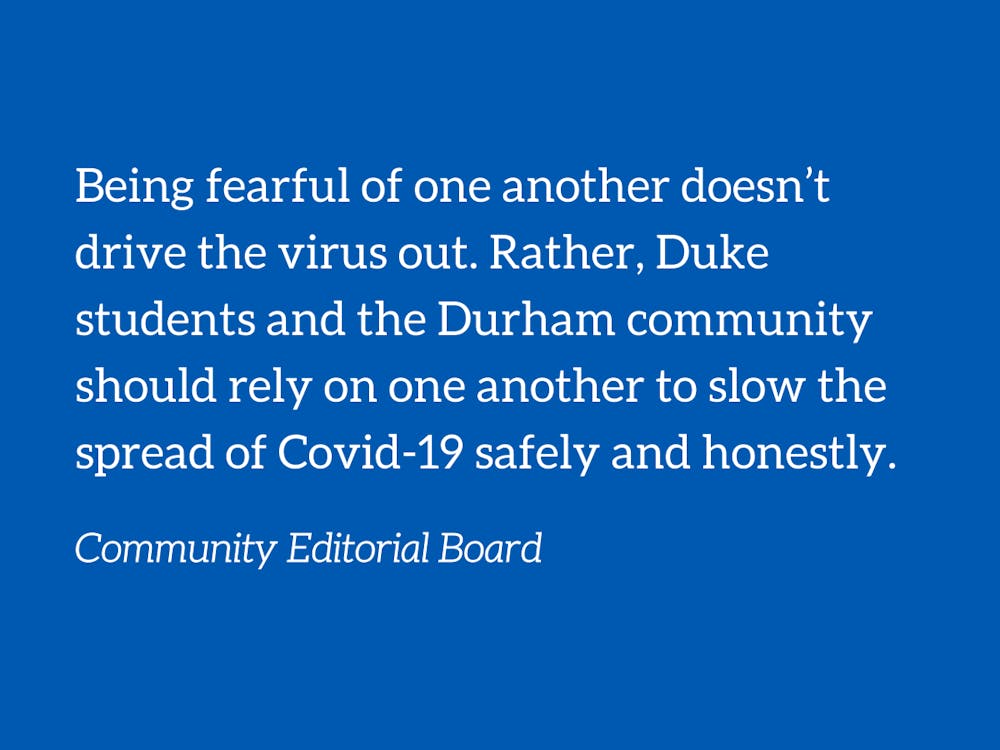In their short walks to pick up pre-ordered food between scheduled library time and online lectures, students inspect each other, always keeping a watchful eye for rule-breakers. In a sense, Duke’s campus has become Foucault’s panopticon, with students charged as the enforcers of the Duke Compact. Students found breaking the rules must be reported. One student allegedly threw a party in their East Campus Dorm. Another was accused of making a drunken getaway after throwing a party in a common room. A third was reported for not wearing a mask in a public space. All of these reports sound true. None of them are. While these stories of false reporting on campus do not discount the numerous true reports of Duke Compact violations, they do highlight the inherent flaws of anonymous student-based reporting.
Under the current system, students may file a report through the University’s Symptom Monitoring app by either speaking to an agent on a hotline or completing an online form. The violation reports are then handled by the Office of Student Conduct, which determines their validity through discussions with the accused students. In many cases, there is simply no way to truly determine whether the incident occurred, and the Office of Student Conduct has not released formal guidelines regarding whether or not the accused student carries the burden of proof.
On top of this uncertainty, a surge in false reports due to misidentification could also cripple Duke’s student-based reporting system. While current data is only anecdotal, it suggests we have a hard time connecting our memories with the facts. Research shows that eyewitness accounts are extremely unreliable and malleable. Most notably, students of color face the highest risk of being mistaken for other classmates. These problems are exacerbated at times like these, when on-campus students already lack familiarity with their peers. Many take their classes exclusively online, have replaced in-person activities with online alternatives and do not have roommates. As a result, students often resort to imprecise physical features, such as skin color, body type and hair color to distinguish those around them. Masks have also impaired Duke students’ ability to identify others, even those that they know well. Since the University’s student reporting system does not include any measures to mitigate unintentional misidentifications, such as photographic proof, students can easily file reports based on false accusations.
It is worth noting that the ambiguity in the reporting policies could work against the social distancing that Duke strives to enforce. If an accused student must produce proof to determine innocence, the potential need for an alibi could promote the very socialization that the University is trying to prevent through the reporting system. It’s easy to claim you weren’t throwing an unmasked party in your dorm room when you were actually at dinner with seven other people.
Student-based reporting not only welcomes inaccurate reports, but also feeds a malicious new brand of “cancel culture,” particularly among the class least likely to know one another: the Class of 2024. During freshman orientation week, first-year students used a 1,300-person group message to collectively condemn those they suspected of violating the Duke Compact. Since then, students have turned towards the Symptom Monitoring app as an outlet for canceling their peers. Because this app gives individuals the option to remain anonymous, students are no longer incentivized by social pressure to confirm the validity of their reports. Although the majority of false claims are likely cases of mistaken identity, anonymous reporting provides an outlet for students to submit false, hostile claims as well.
Think of the long-standing impacts of such a toxic environment on Duke’s community, particularly the Class of 2024: instead of fostering an open and welcoming community, the student-based reporting system has taught many students to fear and resent their own classmates. Off-campus students, who are more likely to know each other and less likely to feel pressured by Duke, are still bound by the Duke Compact and face many of the same ethical challenges when choosing to report their peers. Being fearful of one another doesn’t drive the virus out. Rather, Duke students and the Durham community should rely on one another to slow the spread of Covid-19 safely and honestly.
More than ever, Duke students are rethinking deeply established norms in the University’s fabric, from Greek life and other selective housing to its perverse inequalities and racist history. Others have reconsidered normal methods of fostering a community, such as O-Week and residential programming amidst a pandemic, recession and tumultuous political landscape. However, even as the community reexamines its traditions, it cannot ignore the toxic culture that it is actively brewing. Students at Duke and other universities are isolated, and they fear backlash from each other. Because of this, it should be considered whether Duke’s anonymous reporting system is activating students’ worst, most destructive tendencies at a time in which our community should be brought together rather than torn apart.
The Community Editorial Board is independent from the editorial staff of the Chronicle. Their column runs on alternate Mondays.
Get The Chronicle straight to your inbox
Signup for our weekly newsletter. Cancel at any time.

